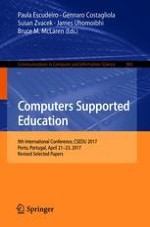2018 | OriginalPaper | Buchkapitel
How Does the Learning Channel Affect Student Satisfaction in Hybrid Courses
verfasst von : Nestori Syynimaa
Erschienen in: Computers Supported Education
Aktivieren Sie unsere intelligente Suche, um passende Fachinhalte oder Patente zu finden.
Wählen Sie Textabschnitte aus um mit Künstlicher Intelligenz passenden Patente zu finden. powered by
Markieren Sie Textabschnitte, um KI-gestützt weitere passende Inhalte zu finden. powered by
